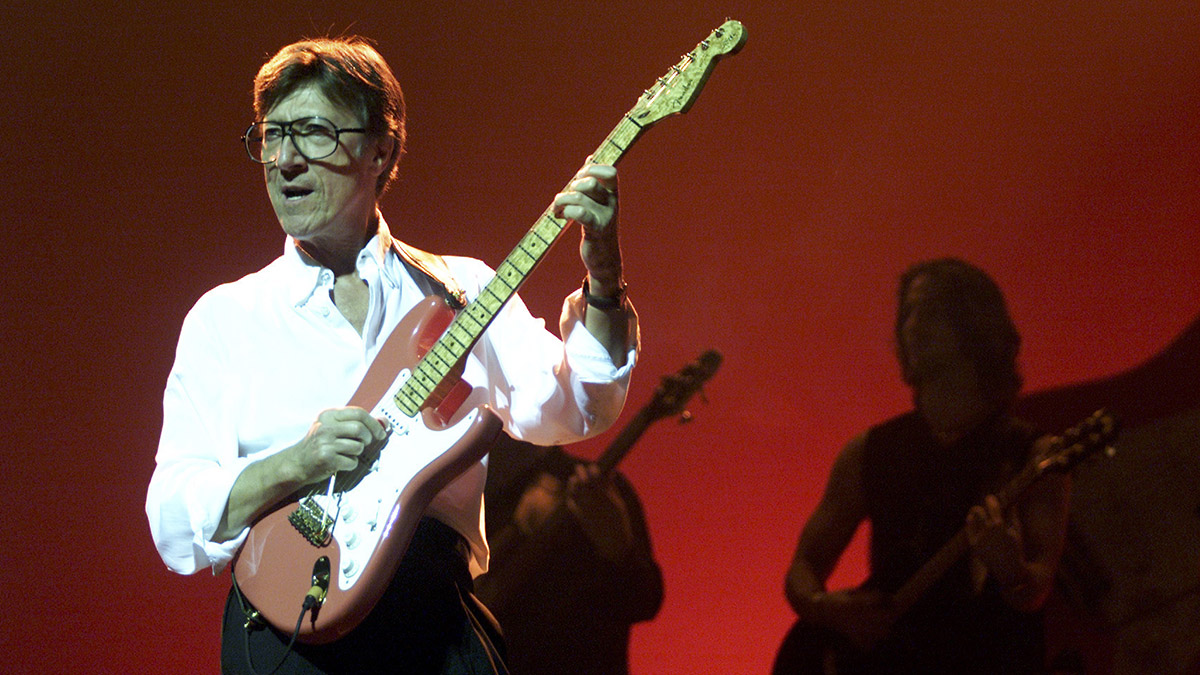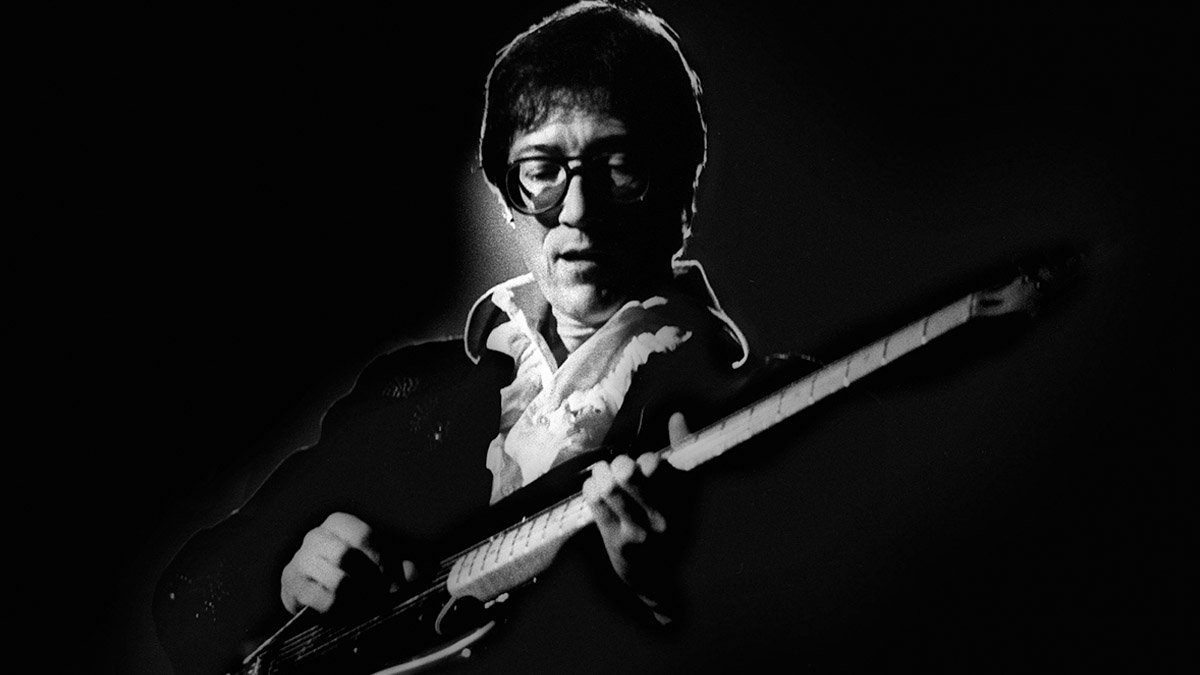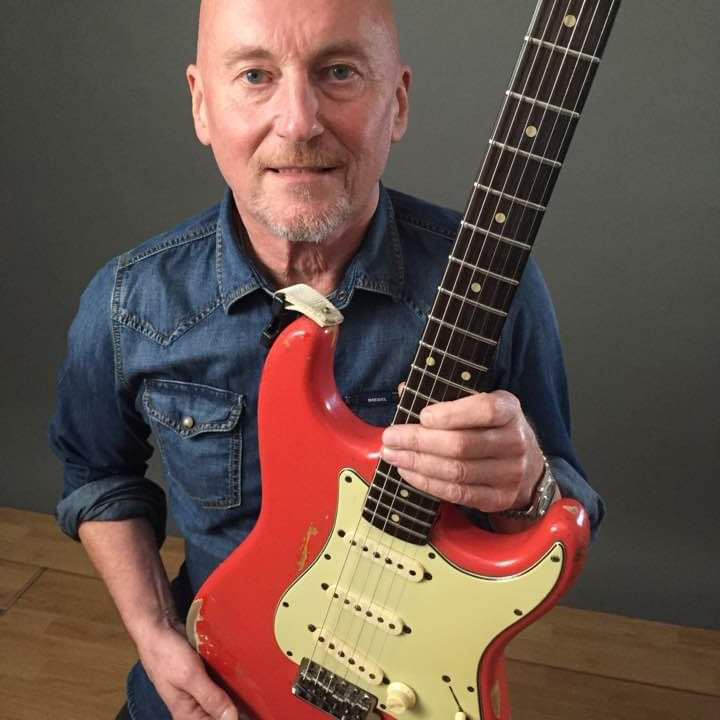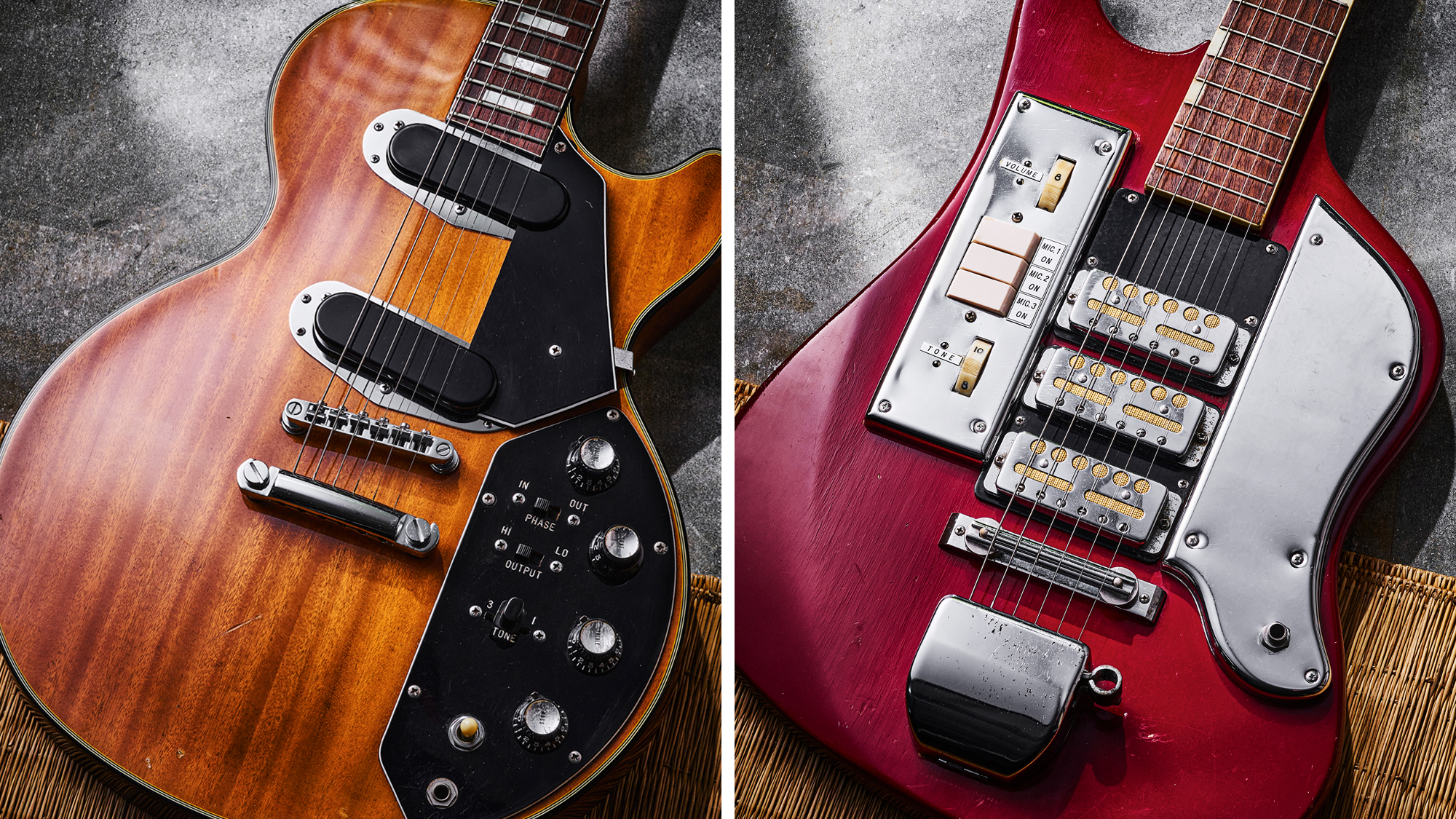Hank Marvin: “When I got the first Strat we’d ordered with a ‘tremolo arm’, I was intrigued. None of us had seen one before or really knew what it did”
Cited by Clapton, May, Page and more, Marvin is the first true legend of instrumental guitar. Here, he talks gypsy jazz, his favorite Shadows tunes, and the genius of Jeff Beck

Hank B. Marvin needs little introduction but it is worth recapping how pivotal he was in the history of instrumental rock, and just how his pioneering style on the electric guitar, specifically making use of the groundbreaking design of the Fender Stratocaster, changed the guitar world for good.
And hip-hop for that matter. The Shadows' Apache was reworked by the Incredible Bongo Band before being sampled and turned into something altogether different by the Sugarhill Gang.
This is the player who lit the fire and showed the way for the likes of Brian May, Jimmy Page, Jeff Beck, Mark Knopfler, Peter Green and a generation of rock players who would take that inspiration and apply it to rock’s growing canon in the ‘60s, ‘70s.
The Shadows made the guitar the center of the pop-cultural universe, Marvin’s melodic sensibility and lyrical phrasing positioning it where the human voice might be. Though in this in-depth interview, in which he reappraises the Shadows’ back catalog, and tells us just what it was like to be among the first cohort of players to get their hands on a Strat, he suggests that this goal, of guitar as vocal, is just that, something for instrumental acts to work towards without necessarily getting there. The voice is something to learn from.
He also shares his thoughts on style, on how outside harmonies don’t work for pop and rock and that is why he avoids “Mongolian throat singing and quarter-tone arthritic licks” and is surely why, all these years on, you hear the lead melody to Apache or FBI and it’s unmistakably Marvin, and it still sounds as fresh as it was when the Strat was the newest solidbody on the block.
What is it about guitar instrumentals that appeals to you?
“I play them so well. Seriously folks, I enjoy the way different guitarists interpret a melody; there’s a variety of genres and also individual styles within the genres that I’m always interested to hear.”
Get The Pick Newsletter
All the latest guitar news, interviews, lessons, reviews, deals and more, direct to your inbox!
What can an instrumental provide the listener that a vocal song can’t?
“The human voice is probably the greatest instrument – easy to carry and doesn’t need a flight case! But the communicative element of a human voice which of course can vocalise the lyric, is enormous. I’m not sure what an instrumental provides the listener that a vocal can’t; perhaps it’s the combination of an appealing tune and the overall sound of the recording. I wish I knew.”
With ‘pop’ or ‘rock-pop’ instrumentals I don’t usually get into playing ‘outside’ harmonies except on the odd occasion when I feel it works without scaring old ladies
Any tendencies when playing them that you like to embrace or avoid?
“When I’m considering an instrumental, whether an interpretation of a known tune or an original, I try to choose a key that will allow me to get the best and most expressive sound (in my opinion) from the guitar appropriate for the composition. I enjoy the variety that different rhythms provide, and as regards harmonies.
“With ‘pop’ or ‘rock-pop’ instrumentals I don’t usually get into playing ‘outside’ harmonies except on the odd occasion when I feel it works without scaring old ladies. As regards musical styles, I usually avoid getting into Mongolian throat singing and quarter-tone arthritic licks.”
Is a typical song structure (verse, chorus, etc) always relevant for an instrumental?
“The typical song structure works very well with instrumentals and it would appear that most follow that format. But I’m sure it’s not the only way to compose a successful instrumental.”
How useful is studying a vocalist’s approach for playing guitar melodies?
“There are many vocalists who interpret a song so well that their phrasing is something I believe instrumentalists can learn from and utilise in their interpretation of melodies.”

How do you start writing an instrumental? Is there a typical approach, or do you prefer to interpret other artists’ compositions?
“When it comes to writing instrumentals there are probably a number of factors to be considered. Are you writing for a specific audience? Is it a ballad, up-tempo, what mood are you trying to create etc? Sometimes an idea for a tune just comes into mind and it might be worthwhile developing (or not).
“In the early ’60s the French comedy actor, writer Jacqui Tati came to one of our shows in Paris and after the show came backstage and told us he would like us to write the theme tune for his next movie which he was then in the process of writing. On returning to England, Bruce (Welch) and I came up with a tune we thought might work with a comedy movie.
“We called it Foot Tapper. The Jacques Tati movie didn’t get made but Foot Tapper ended up in the movie Summer Holiday, and became a number one hit for The Shadows. An example of writing for a specific purpose or mood.”
What typical guitar amp settings have you liked – gain, EQ, volume, etc – when recording?
“The early Vox AC30 amplifiers did not have a Top Boost but still plenty of treble. But when Top Boost models were revealed to us I found that there was so much top available it cut like a sonic knife so I would be very cautious with it. With the Strat, which is a bright sound anyway, I try to set up the amp to temper the brightness with more body from the mid and bass controls.
“The volume depends on other factors; do I require a little overdrive to give me more sustain – the original recordings of Man of Mystery and Shotgun were a little overdriven – or even more overdrive for a solo so the guitar sustains and sings more? For example, the solo in my version of While My Guitar Gently Weeps, the amp was well cranked but still a sweet distortion. Usually though I try to get a clean sound.”
Using the bridge pickup and picking the strings near the neck pickup creates a lovely rounded and warm sound. Is this a tone you were conscious of shaping?
“If I were picking without using the vibrato bar I would probably pick nearer the bridge pickup, but when I pick holding the bar, the length of the bar forces me to pick nearer the neck pickup which does result in a slightly richer, warmer tone. I would like to say it was a cunning plan, but it was just something that happened.”
When I got the first Strat which we’d ordered with a ‘tremolo arm’, actually a vibrato bar, I was intrigued. None of us had seen one before or really knew what it did
At what point did the vibrato arm become a major part of your style?
“When I got the first Strat which we’d ordered with a ‘tremolo arm’, actually a vibrato bar, I was intrigued. None of us had seen one before or really knew what it did, although I soon found out. I started experimenting with it pretty much straight away and found by wobbling the bar I could produce a vibrato, which I’d never heard on an electric guitar before (I’d never heard B.B. King back then).
“The vibrato made the guitar ‘sing’ which I really liked. Also with the very heavy strings we used back then the only string I could bend was the second (B) string and then only a half-step.
“But I discovered that I could pull the bar up and the combination of bend and bar could give me a whole step. Whoopy! I learned to pull other strings up a little or dip them and also create an alarming, vicious wobble as on the intro of Man Of Mystery. The vibrato bar became part of my style during the latter part of 1959.”
What pieces presented the most challenges as regards picking, fretting or vibrato arm approaches?
“We recorded an interpretation of Not Fade Away on the Hank Plays Holly CD, and particularly on the two solos I tried to emulate a slide guitar. I cranked the amp a little for sustain and used a combination of the vibrato bar and just sliding with my fingers, no slide, and it was pretty raucous. Fooled me!
“My picking isn’t that great and so fast passages with the bar in hand can be a challenge. I also have small hands and therefore don’t have the stretch that some genetically blessed players have. But we all work with what we’ve got!”
My favourite keys are usually the keys that for me sound best on a guitar instrumental.
Do you have favourite keys or tempos? Shadows songs tended to be in ‘guitar’ keys.
“Yes. My favourite keys are usually the keys that for me sound best on a guitar instrumental. The Major keys of E, A, D and G are often used and sometimes C. A Minor seems to work well as in Apache, Geronimo, Riders In The Sky etc. Other keys have been used when deemed appropriate. With tempos it’s what works best for the piece, but I don’t really have a favourite tempo.”
Do you find minor or major keys preferable to write or play in?
“I have no preference to playing or writing in major or minor keys. I go where the wind blows.”
What about modulations into new keys? Shadows numbers didn’t often modulate – how about with gypsy jazz?
“Modulations or key changing can give an effective lift to a tune and you’re quite right that we didn’t often do that in the Shads. I wonder why? In fact we went through a period of thinking it was somewhat overdone in pop music so we rarely used it. With gypsy jazz we arranged and recorded one track, Django Reinhardt’s Belleville where in the outro we modulate from D Major to F, and then to G – just to show that we can.
What are your views on harmonising melodies? In The Shadows and beyond you often liked to beef up the melody by playing the tune in 3rds.
“I really like harmonies – the Everly Brothers, The Beach Boys and many more – and as Les Paul showed many years ago on his recordings, harmonies work well on guitars. I usually just add 3rds if I’m playing live, in the studio on occasion I enjoy building a guitar section as part of an arrangement.
“One track I did on the Hank Plays Cliff CD was The Girl in Your Arms, and I tried to produce a more country steel guitar approach which seemed to work well for the song. I used pick and fingers to achieve the double and triple-stopped harmonies and of course vibrato bar. No overdub, I just worked it out and played it.”
What aspects of gypsy jazz music do you like best? Will you re-do any Shadows pieces in this style?
“Gypsy jazz is fun music to play, a lot of old standards as well as Django and modern gypsy compositions. I enjoy the improvising challenges and working out new arrangements with Nunzio and Gary who play in our quartet. We recorded new treatments of Nivram and Guitar Tango which was fun. They are tracks on our second gypsy jazz CD which was recorded around five years ago, but only now just organising the artwork etc.”
What three guitar instrumentals by other artists would you consider iconic, or have inspired you? And why?
“Sleepwalk by Santo and Johnny, although originally played on a steel guitar, has become an iconic piece with a number of guitar covers. It helped me realise that a melodic ballad, played with feeling could reach people and be a success.
“Rebel Rouser by Duane Eddy, again a simple melody but what a great sound on his guitar. The reverb and the tremolo, brilliant! The whole record sounded so big, a good production, it had real attitude. More confirmation to me that a melody doesn’t have to be complicated and that the guitar sound had to have something special, a wow factor – I’m still trying to find it.
“Where Were You by Jeff Beck, a haunting composition beautifully played. Go the whammy bar! I’ve never tried to play it – I know my limitations. It was really inspirational, reaffirming how expressive a Strat can be in the right hands. Thank you, Jeff.”
What are your personal top five Shadows pieces and why?
“In no particular order: Apache, a special place in my heart, our first hit, a wonderful tune, so different in 1960 and still a joy to play. Wonderful Land was another Jerry Lordan composition, but very different in its melodic construction from pretty much everything else happening back then in the world of pop music. It’s a majestic composition. Brilliant!
“FBI was our composition although it had Peter Gormley on the label as the writer, but that’s another story. It was a return to our rock roots and had a simple Pentatonic based bluesy melody with an unusual sequence for the middle eight.
“I picked my guitar strings so hard trying make them ‘explode’ with energy and attitude that my pick burst into flames (okay, a little exaggeration). A few years ago Brian May and Status Quo did a rockin’ version of FBI, but I don’t think Brian’s sixpence melted.
The Theme From The Deerhunter (Cavatina). A beautiful melody we recorded to coincide with the movie’s release. It was a one-take performance from me and it was so emotionally involving. Everything just seemed to work, the volume pedal swelling some of the notes on the string bending, and the Strat sounding about as perfect as I could make it sound.
“The Rise and Fall of Flingel Bunt. Okay, it’s not the greatest melody ever written but it was basically just a jam in Abbey Road studios. We had a break and I was playing what became the opening and closing riff which Brian Bennett heard and asked what’s that?
“I told him I’d just made it up, he liked it and started playing along; our then bass player John Rostill joined in and it turned into a 12-bar jam. I came up with the alleged melody and we decided it was worth arranging and recording, so we did. It was eventually released as a single which turned out to be a good decision, just right for the time.”
In the late '70s and early '80s Neville worked for Selmer/Norlin as one of Gibson's UK guitar repairers, before joining CBS/Fender in the same role. He then moved to the fledgling Guitarist magazine as staff writer, rising to editor in 1986. He remained editor for 14 years before launching and editing Guitar Techniques magazine. Although now semi-retired he still works for both magazines. Neville has been a member of Marty Wilde's 'Wildcats' since 1983, and recorded his own album, The Blues Headlines, in 2019.
“His songs are timeless, you can’t tell if they were written in the 1400s or now”: Michael Hurley, guitarist and singer/songwriter known as the ‘Godfather of freak folk,’ dies at 83
“The future is pretty bright”: Norman's Rare Guitars has unearthed another future blues great – and the 15-year-old guitar star has already jammed with Michael Lemmo

















